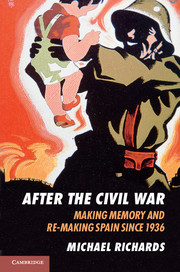Book contents
- Frontmatter
- Contents
- List of maps and tables
- Preface
- Acknowledgements
- Maps
- Introduction: cultural trauma in Spain
- Part I Setting the scene
- Part II Memories of war during the Franco years
- 3 Repression and remembrance: the victors’ liturgy of memory
- 4 Repression and reproduction: social memory in the 1940s
- 5 Memory and politics: from civil war to Cold War
- 6 Memory and migration: flight from the countryside in the 1950s
- 7 Commemorating ‘Franco's peace’: the 25th anniversary of the Victory
- 8 Contesting ‘Franco's peace’: transformation from below in the 1960s
- 9 Transition and reconciliation: politics and the Church in the 1970s
- Part III Memories of war after Franco
- Conclusion: the history of war memories in Spain
- Glossary and abbreviations
- Sources and select bibliography
- Index
- References
5 - Memory and politics: from civil war to Cold War
Published online by Cambridge University Press: 05 June 2013
- Frontmatter
- Contents
- List of maps and tables
- Preface
- Acknowledgements
- Maps
- Introduction: cultural trauma in Spain
- Part I Setting the scene
- Part II Memories of war during the Franco years
- 3 Repression and remembrance: the victors’ liturgy of memory
- 4 Repression and reproduction: social memory in the 1940s
- 5 Memory and politics: from civil war to Cold War
- 6 Memory and migration: flight from the countryside in the 1950s
- 7 Commemorating ‘Franco's peace’: the 25th anniversary of the Victory
- 8 Contesting ‘Franco's peace’: transformation from below in the 1960s
- 9 Transition and reconciliation: politics and the Church in the 1970s
- Part III Memories of war after Franco
- Conclusion: the history of war memories in Spain
- Glossary and abbreviations
- Sources and select bibliography
- Index
- References
Summary
I belong to a generation which lived neither through the war nor the later privations. We lived parenthetically, in a form of limbo in the transition between the post-war and today's society. We have no battles to talk about, nor the great hardships, although, yes, there were some, but we lived our time as well as we could.
Between two wars: generations in the 1950s
As elsewhere, the 1950s in Spain have often seemed in historiographical terms to constitute a lost decade. All periods of history are transitional, but the 1950s, situated temporally between catastrophic war and its harsh aftermath and the consumer society and the ‘economic miracle’, beginning in the early 1960s, seemed peculiarly parenthetical in retrospect. For more than a decade after 1945, Europe lived in the shadow of death, and the relationship between war and post-war would be at the heart of collective representations of the continent's twentieth century. The effects of Spain's war extended into the 1950s when much of Western Europe was in recovery, perpetuating a feeling of political and social stasis: the institutionalisation of the victors' power, the long-lasting implications of intimate violence, the great hunger of the 1940s and ambivalence about reconciliation. The economy returned to depressed pre-war levels of production only in 1954, six or seven years later than other states which had participated in the 1939–45 war, and the effects of this limited Spanish recovery were in any case geographically uneven. Time moved forward at a snail's pace. The Secretary General of the Falange, Raimundo Fernández Cuesta, referred to the vanquished in stark and brutal terms in 1951: ‘between their Spain and ours there is an abyss that can only be crossed by repentance and submission to our doctrine. Otherwise, may they remain on the other side of the abyss, and if they attempt to cross it surreptitiously, may they perish.’
- Type
- Chapter
- Information
- After the Civil WarMaking Memory and Re-Making Spain since 1936, pp. 128 - 155Publisher: Cambridge University PressPrint publication year: 2013

